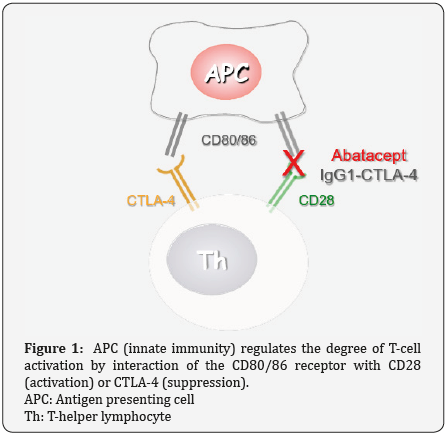Therapeutic Alternatives for The Treatment and Prevention of Dilated Cardiomyopathy (DCM): The Era of Biological Agents-Juniper Publishers
Pharmacology & Clinical Research-Juniper Publishers
Abstract
Dilated Cardiomyopathy is a rare condition that can
be caused by a variety of common morbidities. It is an immune mediated
disease, characterized by chronic stimulation of inflammatory responses.
The so far available treatment consists of agents that ameliorate only
the functional burden off the circulatory system. Biological therapies
have been successfully applied in several diseases derived from hyper
activation of the immune system. In this mini review we investigate
whether abatacept, a biological agent targeting co-stimulation, could be
beneficial in inhibiting pathophysiological progression of DCM.
Dilated Cardiomyopathy–Introduction
Dilated cardiomyopathy is the most common
cardiomyopathy. It reflects a functional state where the anatomic
structures of the heart cannot support a proper blood circulation.
Dilated cardiomyopathy is not a common disease. Nevertheless, its
progression is crucial for the survival of the patient, since it can
lead even rapidly to the need of transplantation. The a etiopathogenesis
of the disease includes some very common morbidities of the general
population, such as hypertension, coronary heart disease and heart
attack. Metabolic diseases such as diabetes mellitus, and thyroid
disease have been associated with DCM. Also, infections predominately
viral can lead to DCM. All these conditions can affect the heart muscle,
which in genetically predisposed patients can favor the development of
DCM [1].
Pathophysiology of DCM: The Role of The Immune System
The role of the immune system has been long ago
documented in the aetiopathogenesis and evolution of the disease. A
proinflammatory microenvironment favors the development of Th1 and Th17
responses of the acquired immunity, This polarization of the adaptive
immunity leads, thru a type IV hypersensitivity reaction (delayed, cell
mediated type of tissue damage), to chronic inflammation, resulting in
functional deregulation of the heart muscle. On this regard,
insufficient mobilization of the homeostatic anti-inflammatory Treg
response confers to further propagation of tissue damage and disease
progression [2].
Therapy: Current Available Agents
Therapeutic interventions consist of cardiovascular
agents that regulate the equilibrium of systemic circulation, thus
compensating the functional impairment of the heart. The so far
therapeutic approach only retards the progression to a non-compensative
heart failure and does not intervene in the pathophysiological evolution
of the disease. It has been already pointed out that DCM is an immune
mediated condition. As a result, several immunosuppressive drugs have
been appointed as potential therapeutic regimes for achieving a certain
degree of disease repression. Nevertheless, the subclinical progression
of the disease is a crucial factor for which the onset of clinical
symptoms is often associated with substantial damage, annulling
practically any benefits of a classical immunosuppressive intervention,
which either way, per se, needs a certain degree of time in order to
produce clinical amelioration.
Biological Therapy
Beyond classical immunosuppression, the era of
biological agents permitted pharmacological manipulation of several
aspects of the immune response, in order to favor the
rearrangement of an immune effective environment that will
retard disease progression in several diseases. Central role in
the establishment of a chronic inflammatory microenvironment
holds the co- stimulatory pathway. This pathway consists of
receptors and ligands that regulate the level of activation of
the adaptive immune response from cells of the innate immune
compartment. The main receptor of this pathway on antigen
presenting cells is CD80/86 that can bind to either CTLA-4
(suppressive) or CD28 (activating) receptors on the surface
of T-cells. The fact that the same receptor on APCs can either
activate of suppress T-cell function, is a sophisticated homeostatic
evolution of the immune system acting as a dimmer that can
properly regulate the level of activation of T-cells (Figure 1).

Abatacept for DCM
In autoimmune diseases, suppression of T-cell activation,
by inhibiting CD80/86-CD28 interaction has been proven
clinically beneficial in conditions such as Rheumatoid Arthritis.
Could the application of such a therapeutic strategy have
beneficial effects of DCM? First of all, it has been documented
that DCM is associated with an enhanced overexpression of
constitutive molecules (CD25) on behalf of T-cells presupposing
CD28 overexpression, both propagating continuous activation
[1]. Furthermore, other reports discuss that the alternative
CD80/86-CTLA-pathway is associated with down regulation of
the inflammatory Th17 response [2], a helper T-cell response that
contributes to the development of DCM. Therefore, the authors
suggest that potential use of the monoclonal antibody abatacept
in DCM, could indeed down regulate T-cell activation in patients
manifesting premature clinical symptoms of DCM (Figure 1).
Blockade of the CD80/86-CD28 pathway with abatacept will also
leave unaffected the suppressive part of the dimmer complex
(CD80/86-CTLA4) further favoring suppression of inflammatory
Th responses (Th17).
Conclusion
Manipulation of the immune system has been proven so far
effective for the treatment of autoimmune diseases and certain
types of malignancies. Sophisticated application of current
biological therapies may still provide therapeutic solutions in
other immune mediated diseases such as DCM.
To know more about Pharmacology & Clinical Research
Click here: https://juniperpublishers.com/jpcr/index.php
To know more about Juniper Publishers
Click here: https://juniperpublishers.com/index.php



Comments
Post a Comment